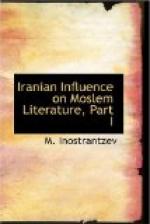Further, undoubtedly under Persian books must be reckoned the book of the ‘Counsels’ of ancient kings and the book of the ‘Questions’ to certain Wisemen, and their Answers. If these are not of direct Persian origin they are similar in contents to Persian books. Two books included in this list, namely, one by a certain Christian on ethico-didactical subjects as is stated in the title itself, drawn from Persian, Greek and Arabic sources, and the other, a book translated by the author of the Fihrist himself containing the anecdotes regarding the people of a superior class and of the middle class—these two books on account of their contents embody the experiences relating to ethico-didactical questions and were of the nature of compilation similar to the book of Ibn Miskawaihi of whom we shall speak later on. Finally, all the remaining books relate to that class of anecdotal and didactic literature which spread so wide among Arabic writers through Pahlavi and originating from Indian authors. Such books were, for instance, the story of Despair and Hope, the Book of Hearing and Judgment, the Book of the two Indians, a liberal man and a miser, their disputation, and the judgment passed on them by the Indian prince, etc. That our assumption is highly probable is confirmed by the mention among these books of the book of the philosopher and his experiences with the slave girl Kaytar.[1]
[Footnote 1: This book no doubt is a portion of the well-known fable Lai d’—Aristote preserved in certain ancient monuments of Arabic literature. The same book is mentioned among Persian books in another place in the Fihrist. (305-6). Kitab Musk Zanameh, w[=a] shah Zanan. These two books have been variously transcribed by the copyists.]
The name has been much mutilated and serves as an example of the degree to which Persian titles have been corrupted. Nevertheless, thanks to the circumstance that the name of the slave girl has come down to us, in the Arabic version of the story we are able to trace the title adduced in the Fihrist.[1]
[Footnote 1: Le Livre des beautes et des antithesis attribute a Abu Othman Amr ibn Bahr al-Djahiz texte publie par G. Van Vloten, Leyde, 1898, 225-257; E. G., Browne, “some account of the Arabic work entitled Nihayatu’l-irab fi Akhbari’l Furs wa’l-Arab,” particularly of that part which treats of the Persian kings, J.R.A.S. (900, 243-245).]
This name is Mushk Daneh or a grain of Musk. The book of Musk Daneh and the mobed became famous in Arabic literature as a separate Persian composition.[2]
[Footnote 2: Similarly the title Shahzanan in the Fihrist is possibly Mobedan, (See Browne 244, 2, 3, 11, 15; 245, 4, 15; and Van Vloten 255, 16; 256, 1, 4, 14; 257, 7, 9; or Shaikh al mobedan, Browne 245.)]
CHAPTER IV
The Persian, sources of the compilation of Ibn Miskawaihi 54
Preponderance of the Persian element in the evolution of the Musalman morals 57




